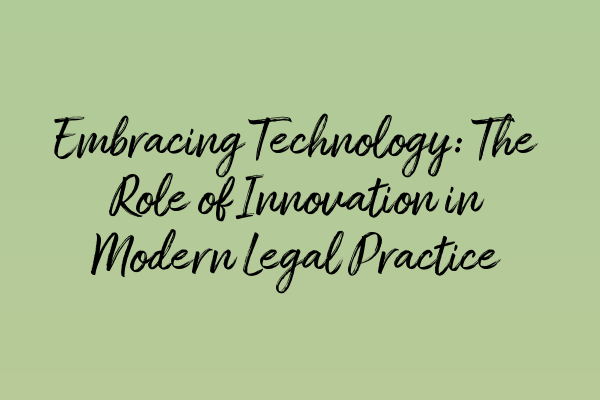Embracing Technology: The Role of Innovation in Modern Legal Practice
In today’s rapidly evolving world, the legal profession is not immune to the technological advancements that surround us. In fact, embracing technology has become crucial for law firms to stay competitive and efficient in delivering legal services. Innovative solutions have revolutionized the way legal professionals work, transforming traditional practices into streamlined, tech-driven processes that benefit both clients and practitioners.
One of the key areas where technology has made its mark is in enhancing the efficiency of legal research. Gone are the days of laboriously sifting through stacks of law books in search of a specific case or precedent. With online legal databases and search engines, legal professionals now have access to an abundance of legal information at their fingertips. Platforms such as Westlaw and LexisNexis have become indispensable tools in legal research, offering comprehensive databases, case law analyses, and advanced search capabilities.
Moreover, technology has significantly improved the organization and management of law firms’ documents and case files. Electronic document management systems have replaced the need for physical storage spaces, eliminating the hassle of storing, retrieving, and safeguarding paper documents. This not only saves valuable office space but also enables lawyers to access files from anywhere at any time, increasing flexibility and productivity.
Another significant technological breakthrough in the legal field is the digitalization of courtrooms. With the advent of videoconferencing and virtual courtrooms, legal professionals can now attend hearings remotely, saving time, costs, and eliminating the need for unnecessary travel. This has proven especially beneficial for cases involving geographically dispersed parties or international clients.
The role of artificial intelligence (AI) in legal practice is also expanding rapidly. AI-powered software can analyze large volumes of data, identify patterns, and provide valuable insights for legal decision-making. For example, contract review and due diligence processes can be streamlined through the use of AI algorithms, significantly reducing the time and effort required.
Furthermore, technology has revolutionized client communication and collaboration. Law firms now have the ability to leverage various online platforms and tools to enhance client interactions. From secure client portals for sharing documents and updates to video conferencing for remote consultations, technology has made it easier than ever for lawyers to connect with their clients, regardless of geographical distance.
Additionally, the rise of legal practice management software has transformed the way law firms operate internally. These comprehensive software solutions provide a range of functionalities, including time tracking, billing, client and case management, and document automation. By automating administrative tasks, lawyers can focus more on delivering high-quality legal services, resulting in increased client satisfaction and improved efficiency.
However, it is essential to recognize that embracing technology in the legal profession comes with both opportunities and challenges. While technology offers numerous benefits, it also raises concerns such as data security and confidentiality. Law firms must remain vigilant in protecting client information and complying with applicable data protection regulations. It is crucial to implement robust security measures and stay updated on the latest cybersecurity threats and solutions.
In conclusion, the role of technology and innovation in modern legal practice cannot be overstated. From transforming legal research to facilitating remote hearings, technology has revolutionized the way legal services are delivered. Law firms that embrace technology gain a competitive edge, increase efficiency, enhance client satisfaction, and streamline internal processes. As technology continues to evolve, it is imperative for legal professionals to stay abreast of emerging trends and adapt to the changing landscape of the legal industry.
Related Articles:
– A Closer Look at the Bar Professional Training Course (BPTC)
– The Role of Technology in Modern Legal Practice
– A Look into Prominent Law Firms in the UK
– Debunking Common Misconceptions about Solicitors
– Networking Strategies for Solicitors: Building a Strong Professional Network


Leave a Reply